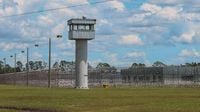Florida’s immigration policy landscape took a dramatic turn this week as the state opened its second major migrant detention facility—dubbed the “Deportation Depot”—in Baker County, just days after a pivotal federal court ruling allowed the controversial “Alligator Alcatraz” center in the Everglades to remain operational. The move, championed by Governor Ron DeSantis, signals an intensification of the state’s efforts to support President Donald Trump’s mass deportation agenda and has sparked fierce debate across political, legal, and environmental circles.
The newly operational Deportation Depot occupies the former Baker Correctional Institution, a state prison mothballed four years ago due to staffing shortages. Located about 45 miles west of Jacksonville near the Osceola National Forest, the facility began receiving detainees on Tuesday, September 2, 2025. As of Friday, September 5, it was housing 117 individuals, with the capacity to hold up to 1,500 people, according to the governor’s office and multiple media outlets including Fox News and CNN.
The announcement of the facility’s opening came on Thursday, September 4, just hours after a federal appeals court in Atlanta issued a 2-1 decision to pause a lower court’s order that would have forced the shutdown of the Everglades-based Alligator Alcatraz by the end of September. That lower court order, issued by U.S. District Judge Kathleen Williams, had required Florida to transfer detainees out of the Everglades site and halt further expansion. The appeals court’s decision means both facilities can continue operating while legal challenges play out—a significant victory for DeSantis and his allies.
“We’re not only doing Alligator Alcatraz, we’ve now opened the Deportation Depot up in Northeast Florida, and we’re working on opening a Panhandle Pokey in northwest Florida,” DeSantis declared Thursday night during an appearance on FOX News. He emphasized that expanding facilities across different regions would enable the state to deport migrants more quickly and efficiently. “You know, you’re in the Panhandle sending to Alligator Alcatraz, that’s a long way. Even sending to the Deportation Depot in North Florida, that could be three to five hours depending on where you are in the Panhandle,” he explained at a recent press conference.
The state’s ambitions don’t stop at Baker County. DeSantis has announced plans for a third facility, the so-called “Panhandle Pokey,” though its location and opening date remain undecided. There are also discussions about a possible site at Camp Blanding, a National Guard training center southwest of Jacksonville. Florida’s approach mirrors similar moves in other states, such as Indiana’s “Speedway Slammer” and Louisiana’s “Camp 57,” as the federal government seeks to address what it calls limited capacity in immigration detention centers nationwide.
Florida Attorney General James Uthmeier voiced strong support for the expansion, telling Fox News, “The Baker County facility will now be a great supplement to Alligator Alcatraz. We’ll use as many of the detention spaces as we can. We want to fill them up. We want to deliver on this mission. The Baker County site was actually a pre-existing state jail that was no longer in use. So it’s already retrofitted out to hold a lot of people. We’ll fill it up quickly, and we’ll put it to good use.” Uthmeier added, “No limits. We will fill it up with thousands of detainees, and we will get these criminal aliens back where they came from.”
DeSantis has touted the cost-efficiency of the new center, noting that the build-out of Deportation Depot cost about $6 million—a figure he described as significantly less than the price tag for Alligator Alcatraz. He also stated that the federal government will reimburse Florida for all immigration detention expenditures, according to CNN.
The push for expanded detention comes as the White House continues to press for at least 3,000 immigration-related arrests per day as part of broader mass deportation efforts. Many detainees have already been sent to Guantanamo Bay or deported to El Salvador’s CECOT mega prison, according to Fox News and The Associated Press.
But the expansion has not gone unchallenged. The Everglades facility, in particular, has been the focus of heated criticism from environmental groups and members of Congress. A lawsuit filed by Friends of the Everglades, the Center for Biological Diversity, and the Miccosukee Tribe of Indians of Florida alleges that state and federal officials failed to conduct the required environmental-impact study before constructing the detention center. The groups argue that the facility threatens sensitive wetlands and protected species, and they have called for its immediate closure following reports of poor conditions—including sweltering heat, bug infestations, and inadequate meals—experienced by detainees.
Despite these concerns, the recent court ruling has allowed Alligator Alcatraz to remain “open for business,” as DeSantis put it on social media. “We said we would fight that. We said the mission would continue. So Alligator Alcatraz is in fact, like we’ve always said, open for business,” he announced, pushing back against claims that the facility was on the brink of closure.
The legal battle is far from over. The appeals court’s stay is only temporary, pending the outcome of the state’s appeal. Environmental advocates and tribal representatives remain determined to pursue their case, insisting that federal law requires a thorough environmental review before any further expansion or construction can proceed in the Everglades. Meanwhile, the state is moving full speed ahead, with officials expressing confidence that the new Deportation Depot will face no significant legal resistance.
The broader context is one of mounting national tension over immigration policy. As other states follow Florida’s lead in expanding detention capacity, the debate over the humanitarian, legal, and environmental implications of these facilities is likely to intensify. For now, however, Florida’s Deportation Depot stands as the latest—and perhaps most visible—symbol of the state’s commitment to a hardline approach on immigration enforcement. Whether this strategy will withstand ongoing legal scrutiny and public outcry remains to be seen, but for the thousands of migrants who may soon find themselves behind its fences, the stakes could not be higher.
As the court battles continue and the state’s plans for further expansion unfold, all eyes will remain on Florida’s detention centers—a focal point in the nation’s ongoing struggle to define its immigration future.






